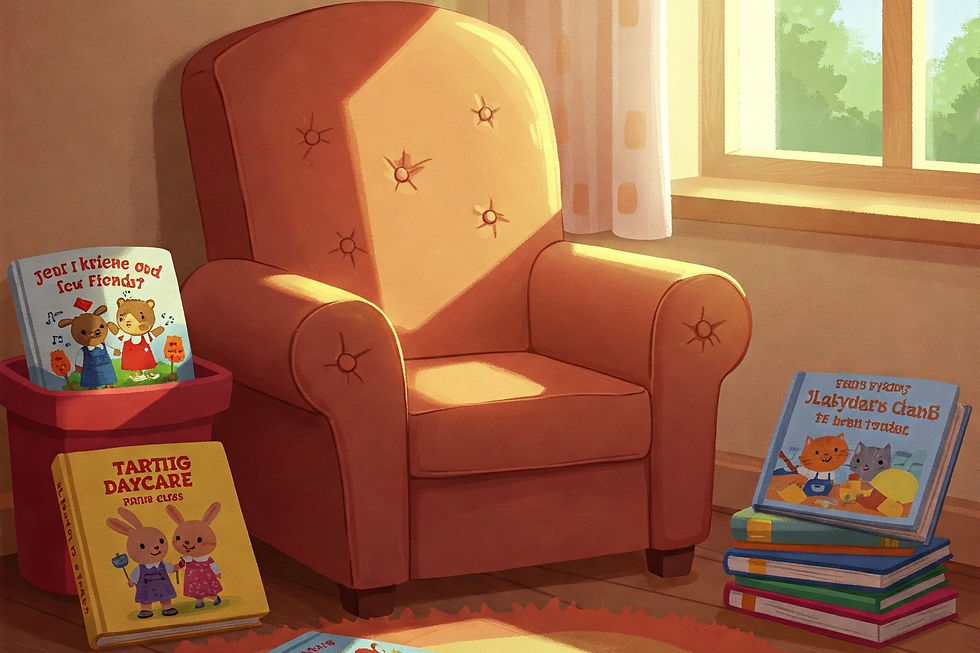The Art of the Playdate: Fostering Connection and Social Growth
- Marshall Chadbourne
- Oct 19, 2024
- 3 min read

Playdates. They're a fundamental part of childhood, offering opportunities for social interaction, imaginative play, and the development of essential life skills. But as any parent knows, orchestrating a successful playdate involves more than just throwing a few kids together with a pile of toys.
While spontaneous gatherings can be delightful, a touch of thoughtful planning can significantly enhance the experience for everyone involved. This blog post serves as a guide for parents, providing insights and strategies to navigate the nuances of playdates and create an environment where children can truly thrive.
We'll delve into key aspects of successful playdates, from pre-planning considerations to navigating social dynamics and managing those inevitable moments of conflict. Whether you're a seasoned playdate pro or a nervous newbie, you'll find valuable tips to help your child (and you!) reap the many benefits of these social gatherings.
Setting the Stage: Pre-Playdate Prep
Just like a successful dinner party requires more than just inviting guests, a successful playdate involves some thoughtful planning. Here are some key considerations:
Age-Appropriate Activities: Consider the age and developmental stage of the children involved. Toddlers might thrive with sensory bins and simple toys, while preschoolers might enjoy imaginative play or art projects.
The Guest List: Keep it manageable! Start with smaller groups, especially for younger children, to avoid overwhelming them.
Location, Location, Location: Choose a space that's safe, comfortable, and conducive to play. A backyard, a playroom, or even a local park can be great options.
Time It Right: Aim for a time of day when children are typically well-rested and fed. Avoid scheduling playdates too close to naptime or mealtime to minimize potential meltdowns.
Communication is Key: Touch base with the other parent(s) beforehand. Discuss any allergies, sensitivities, or special needs to ensure a smooth and enjoyable experience for everyone.
Navigating the Social Scene: Encouraging Positive Interactions
Playdates are prime opportunities for children to develop crucial social skills. Here's how you can help foster positive interactions:
Set the Tone: Create a welcoming and inclusive atmosphere. Encourage sharing, turn-taking, and using kind words.
Observe and Guide: While giving children space to play independently, be attentive to their interactions. Gently guide them towards resolving conflicts and navigating social dynamics.
Model Positive Behavior: Children learn by watching! Demonstrate empathy, kindness, and respectful communication in your own interactions with children and other adults.
Celebrate Successes: Acknowledge and praise positive social behaviors like sharing, helping, and including others.
Handling the Hiccups: Managing Conflict and Meltdowns
Let's be real, even the best-planned playdates can have their share of hiccups. Here's how to handle those inevitable moments of conflict or meltdowns:
Stay Calm: Children take cues from adults. If you remain calm and composed, it will help de-escalate the situation.
Acknowledge Feelings: Validate the child's emotions, even if the reason for their upset seems trivial. Saying something like, "I understand you're feeling frustrated because you wanted that toy," can go a long way.
Offer Choices: Empower children to find solutions by offering choices. "Would you like to take turns with the toy, or would you like to play with something else?"
Know When to Intervene: If the conflict is escalating or a child is becoming overwhelmed, step in to provide support and guidance.
The Parent Perspective: Connecting with Other Adults
Playdates aren't just for kids! They offer a valuable opportunity for parents to connect, share experiences, and build community.
Engage in Conversation: Take the time to chat with other parents, even if it's just for a few minutes. Share parenting tips, relatable stories, or simply enjoy some adult conversation.
Offer Support: Be mindful of other parents' needs. Offer a helping hand if you see someone struggling or lend a listening ear if someone needs to vent.
Build Relationships: Playdates can be the foundation for lasting friendships. Exchange contact information and plan future outings together.
By following these tips and embracing the spirit of playfulness and understanding, you can transform playdates from potentially stressful events into enriching experiences that foster connection, social growth, and lasting memories for both children and parents.
Playdates, while sometimes presenting challenges, are invaluable opportunities for children to develop social skills, build friendships, and learn through play. By approaching these gatherings with intention and utilizing the strategies outlined in this blog post, parents can create a positive and enriching experience for everyone involved. Remember, the key ingredients are planning, communication, and a willingness to embrace the beautiful chaos that comes with childhood friendships. So, go forth and orchestrate those playdates with confidence! Your children (and your own social life) will thank you.




Comments